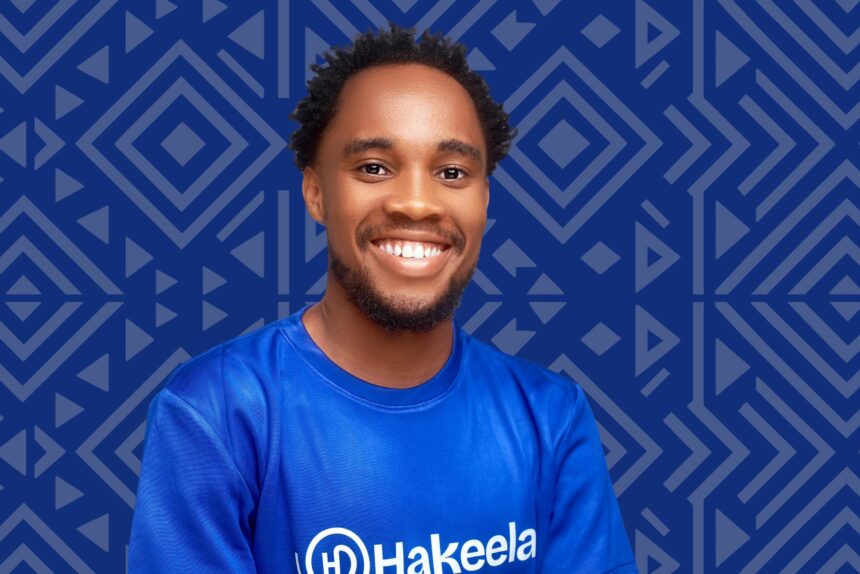Across Africa, the promise of the digital economy is growing, yet so is the divide. Every year, millions of young Africans with extraordinary potential are quietly excluded from opportunities simply because the systems meant to prepare them were not built for them.
The digital learning landscape remains largely inaccessible for individuals with special needs, and difficult to navigate for young people in underserved communities.
They face a web of challenges, from inaccessible learning platforms, a lack of tailored support, poor digital infrastructure, social stigma, to limited career pathways.
This glaring reality demands not just intervention, but transformation.
In this edition of Techparley’s Drive100 where we celebrate Africa’s most innovative emerging startups, we spotlight Hakeela, a visionary startup answering that call with courage, clarity, and innovation.
As an AI-powered inclusive EdTech platform founded by Victor Eyo, Hakeela is reshaping what digital learning means for young Africans across the continent.
It is a platform built not simply to teach skills, but to remove barriers, restore confidence, and rebuild the bridge between learning and opportunity.
As Hakeela’s founder puts it, “millions of talented youth are left out of the digital economy because education systems and learning platforms are not inclusive or accessible.”
Hakeela’s mission is bold yet deeply human, simply to “make digital education open to all”, especially for individuals with special needs and marginalized youth who have long been left behind.
What You Should Know About Hakeela
Hakeela was born from a recognition that access should never determine destiny. The platform exists as an alternative pathway for learners who are often overlooked or ignored by mainstream digital education systems.
It is intentionally crafted for those who need structured support, adaptive learning, and a nurturing community.
“Our platform offers digital skill training, entrepreneurship support, and job pathways that help learners turn knowledge into opportunity,” the founder explains.
This goes beyond content delivery, Hakeela is a system of empowerment designed to transform learning outcomes into livelihood outcomes.
The platform provides:
- Tailored digital and entrepreneurial skills
- Inclusive learning for disabilities
- Pathways into jobs, internships, and startup ecosystems
- A community that reinforces belonging, peer support, and shared growth
Hakeela exists not as a supplementary learning tool, but as a lifeline for young people who would otherwise remain outside the digital economy.
Every feature, every program, and every intervention is rooted in the understanding that accessibility is not optional, but foundational.
Inside Hakeela’s Inclusive Model: How the Startup Operates
Hakeela’s approach is an intricate blend of technology, accessibility design, and social innovation.
The startup operates at the intersection of education, inclusion, and economic empowerment, using AI to tailor learning experiences in ways traditional platforms simply cannot.
Learners receive:
- Personalized learning paths driven by artificial intelligence
- Assistive-friendly tools to accommodate various disabilities
- Real-world skills in tech, design, business, and digital communications
- Mentorship from industry professionals and trained facilitators
- Access to internships and job placements
- Entrepreneurship support that helps convert skills into ventures
- Community learning spaces that create belonging and reduce stigma
The team states that Hakeela “empowers young people with special needs and those from underserved backgrounds to gain practical tech skills and connect to jobs and entrepreneurship opportunities.”
The platform is built to be adaptable, meaning learners with visual, hearing, mobility, or cognitive challenges encounter tools designed specifically for their needs.
This level of personalized accommodation is rare in African EdTech.
“Hakeela is more than a platform, it is a community where inclusion, innovation, and opportunity grow together,” Victor summarized clearly.
Hakeela’s Traction, Progress and Milestones
In a landscape where many ideas struggle to become realities, Hakeela has achieved remarkable traction in a short time. What began as a self-funded initiative has grown into a continental force for inclusion in digital learning.
Thus far, the organization has empowered over 5,000 marginalized and special-needs learners across Nigeria, Ghana, Malawi, and Rwanda.
Through a mix of hybrid and virtual programs, community outreach, and mentorship structures, young people have been able to acquire relevant skills, connect to real opportunities, and build confidence in their abilities.
“We’ve raised $15,000 in grants, earned recognition for inclusive tech innovation, and been featured in The Guardian Nigeria, BlankPaperz, and Loyal Insight,” the founder recounted proudly.
Among its most transformative achievements is the launch of Africa’s first inclusive digital skills fellowship, a program developed to ensure that special-needs learners and underserved youth can access structured training without barriers.
The fellowship has:
- Introduced tailored learning cohorts across four countries
- Built localized models adaptable to rural and urban settings
- Enabled job placements, startup launches, and internship programs
- Inspired community-driven advocacy for inclusive tech adoption
Each milestone is a testament to a continent waking up to the critical need for inclusion. With every country Hakeela reaches, the digital future becomes more accessible for those who once had no seat at the table.
Meet the Team Powering Hakeela’s Missions
Behind Hakeela’s growing footprint is a committed team whose passion is rooted in personal experience and shared values. Each member contributes strategically to the mission of creating inclusive digital empowerment across Africa.
Victor Eyo (Founder and Director): Leads strategy, partnerships, vision, and pan-African expansion. His background in technology and inclusive education drives the organization’s long-term direction.
Oluwatoyin Joy Yerokun (Assistant Director and Project Manager): Ensures programs remain impactful and sustainable through meticulous project oversight and human-centered operations.
Divine Harrison (Media Director): Shapes the narrative of Hakeela’s work, ensuring its impact reaches institutions, partners, and beneficiaries across regions.
Comfort Alphonsus (Chief Graphics Designer): Crafts inclusive and assistive-friendly design assets that communicate Hakeela’s mission visually and accessibly.
Emmanuel Edor (Chief Product Designer): Builds user-friendly products and learning interfaces optimized for learners with diverse abilities.
Lawrence Godwin (Community and Outreach Manager): Leads strategic outreach, partnerships, advocacy, and engagement that sustain Hakeela’s community-led approach.
“Our team has experienced the challenges we now solve,” emphasizing the shared philosophy of the team.
This empathy-driven foundation gives Hakeela a rare authenticity, the team is not just building solutions; they are building what they wished existed when they needed it most.
Challenges, and How Hakeela is Taking Them Head-on
Like many mission-driven African startups, Hakeela’s journey has been shaped by resilience. Funding constraints, sustainability concerns, infrastructure gaps, and team coordination across regions formed the early roadblocks the team had to overcome.
Initially, the startup operated primarily through personal funds and small community donations. To evolve beyond this, the team strategically began applying for grants, strengthening partnerships, documenting impact, and refining their sustainability model.
“We are developing a sustainable model that combines free community programs with paid institutional training, consulting services, and a talent-matching platform,” Victor noted.
This hybrid approach ensures that marginalized learners continue to access programs at no cost, while independent revenue streams support long-term stability.
Infrastructure remains another significant challenge, particularly for learners with disabilities living in remote or rural communities where digital access is limited.
Hakeela tackles this through:
- Local partnerships with NGOs
- Volunteers who provide support across regions
- Offline learning tools where internet access is unstable
- Hybrid learning hubs in emerging communities
Each challenge has shaped the startup into something stronger, more adaptable, and more mission-aligned.
The Road Ahead: Future Expansion Vision and Target Population
Hakeela’s vision for the future is deeply ambitious yet firmly grounded in its track record. The startup’s roadmap outlines a multi-year transformation that aims to redefine inclusive digital education across the continent.
In the next 6–12 months, Hakeela plans to:
- Launch its AI-powered learning platform
- Establish pilot inclusive tech hubs
- Form new strategic partnerships
- Scale job and internship placement pipelines
In 2–3 years, the organization aims to:
- Expand into 10 African countries
- Build a continental network of inclusive tech hubs
- Increase training programs for special-needs and underserved youth
- Strengthen employment and startup pathways,
And by year five, Hakeela envisions:
- Impacting 100,000 marginalized and special-needs young Africans
- Developing an ecosystem where alumni launch startups, lead initiatives, and contribute to the digital workforce
- Establishing Africa’s most robust pipeline for inclusive digital talent
- Becoming a continental authority in inclusive EdTech and digital empowerment
Summarizing this future, the founder says the goal is to create “long-term work and leadership opportunities for young Africans with special needs and those from underserved communities.”
Talking Points
Hakeela’s operations demonstrate impressive heart, clear intent, and real early traction, but the startup’s model still needs tighter operational discipline to fully match its ambition.
Its inclusive mission is powerful, and its reach across multiple African countries is notable, yet the breadth of activities, training, fellowships, community programs, consulting, talent matching, and plans for assistive-tech product development, risks stretching a relatively small team too thin without a clearly sequenced operational roadmap.
The impact numbers are promising but would benefit from stronger monitoring frameworks that show consistent learner progression from training to actual employment or enterprise creation.
While the hybrid community-driven model helps overcome infrastructure gaps, it also requires stronger partner management systems to ensure quality and continuity across regions.
In summary, Hakeela’s vision is compelling and socially urgent, but refining its operational focus, strengthening its outcome tracking, and prioritizing its core product will be essential to convert its admirable mission into scalable, long-term, and measurable impact.
_____________________
Bookmark Techparley.com for the most insightful technology news from the African continent.
Follow us on X/Twitter @Techparleynews, on Facebook at Techparley Africa, on LinkedIn at Techparley Africa, or on Instagram at Techparleynews






